Trespass To Property Assignment Report
VerifiedAdded on 2022/09/18
|12
|649
|30
Presentation
AI Summary
Contribute Materials
Your contribution can guide someone’s learning journey. Share your
documents today.
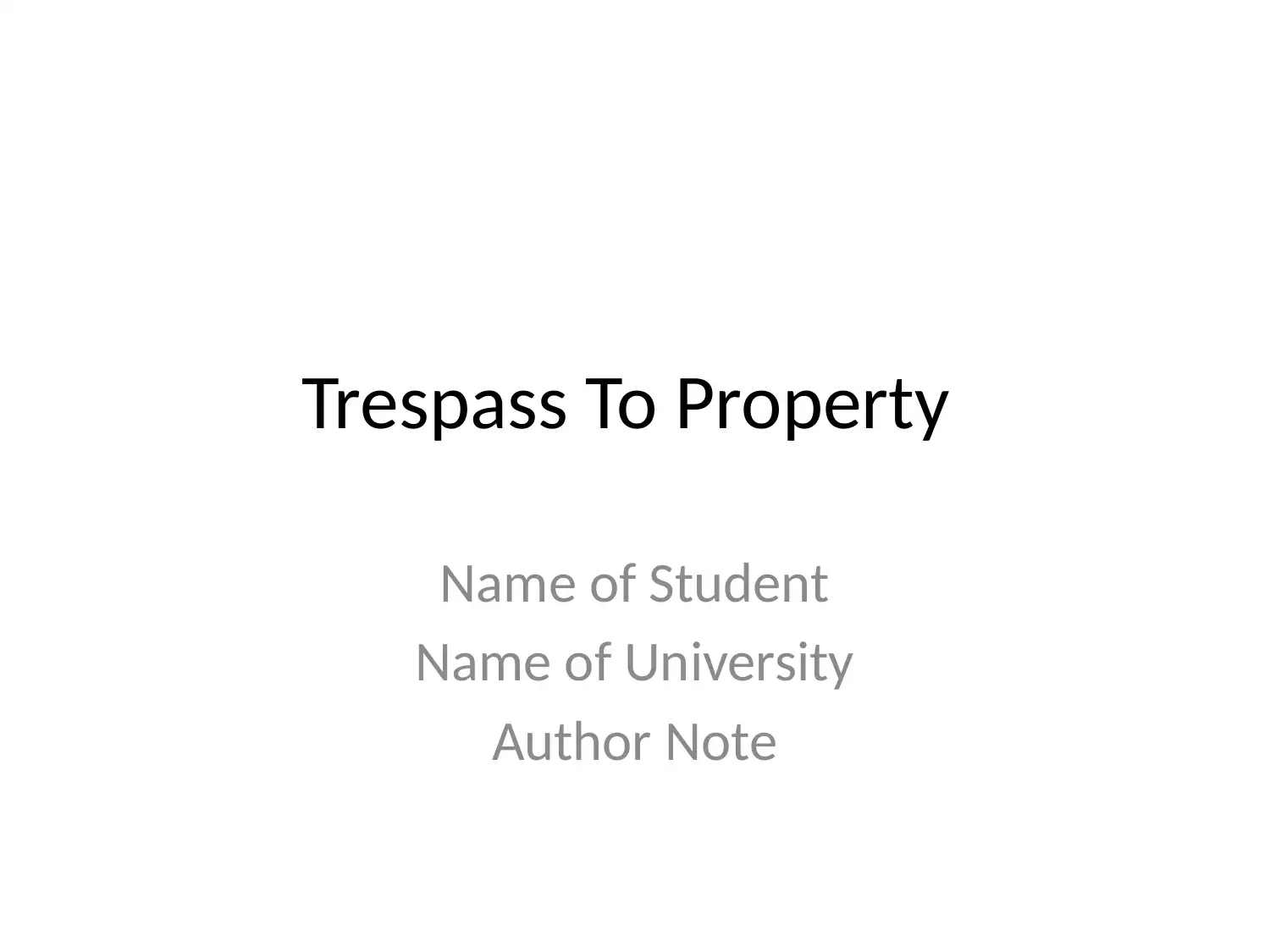
Trespass To Property
Name of Student
Name of University
Author Note
Name of Student
Name of University
Author Note
Secure Best Marks with AI Grader
Need help grading? Try our AI Grader for instant feedback on your assignments.
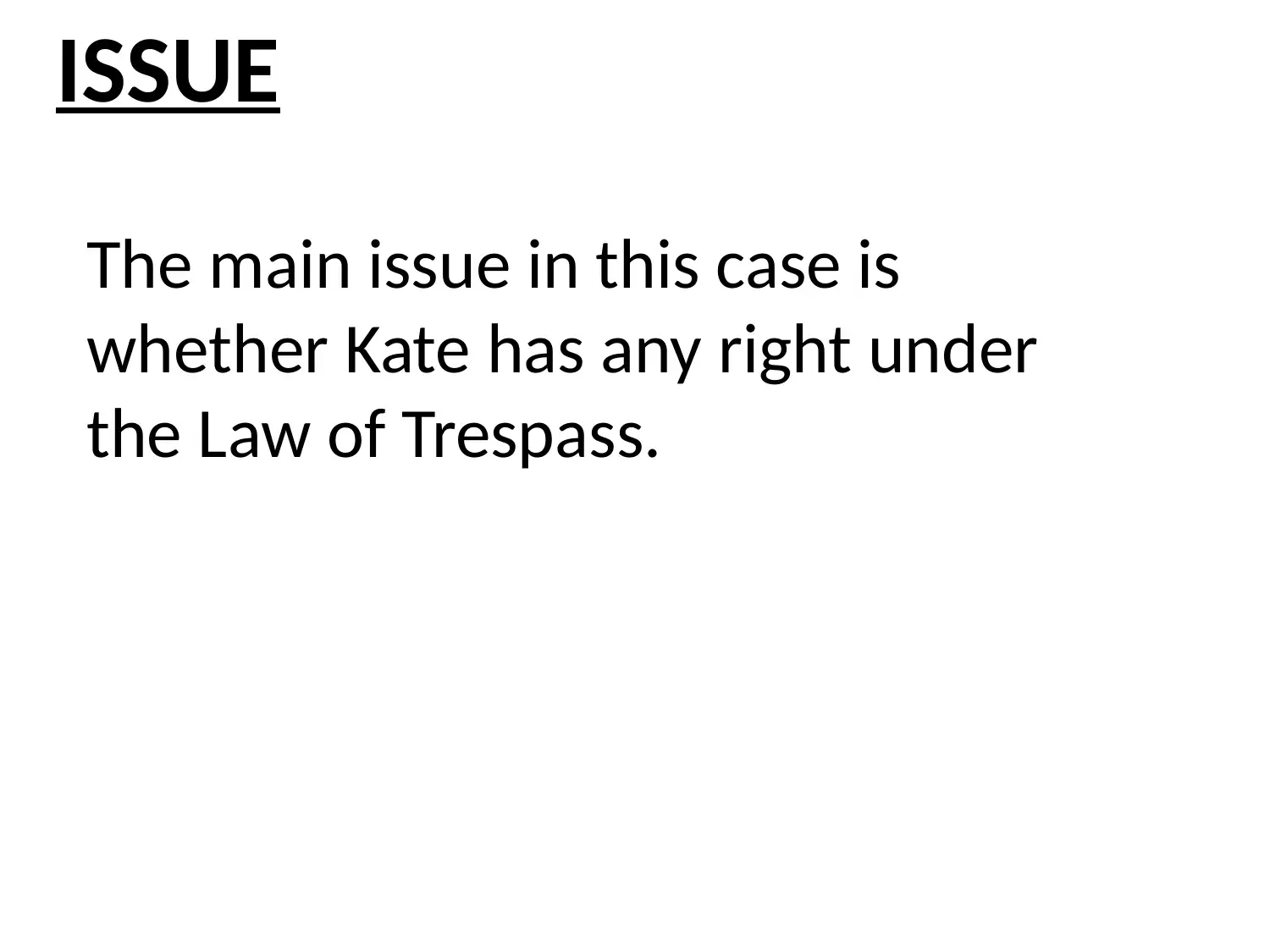
ISSUE
The main issue in this case is
whether Kate has any right under
the Law of Trespass.
The main issue in this case is
whether Kate has any right under
the Law of Trespass.
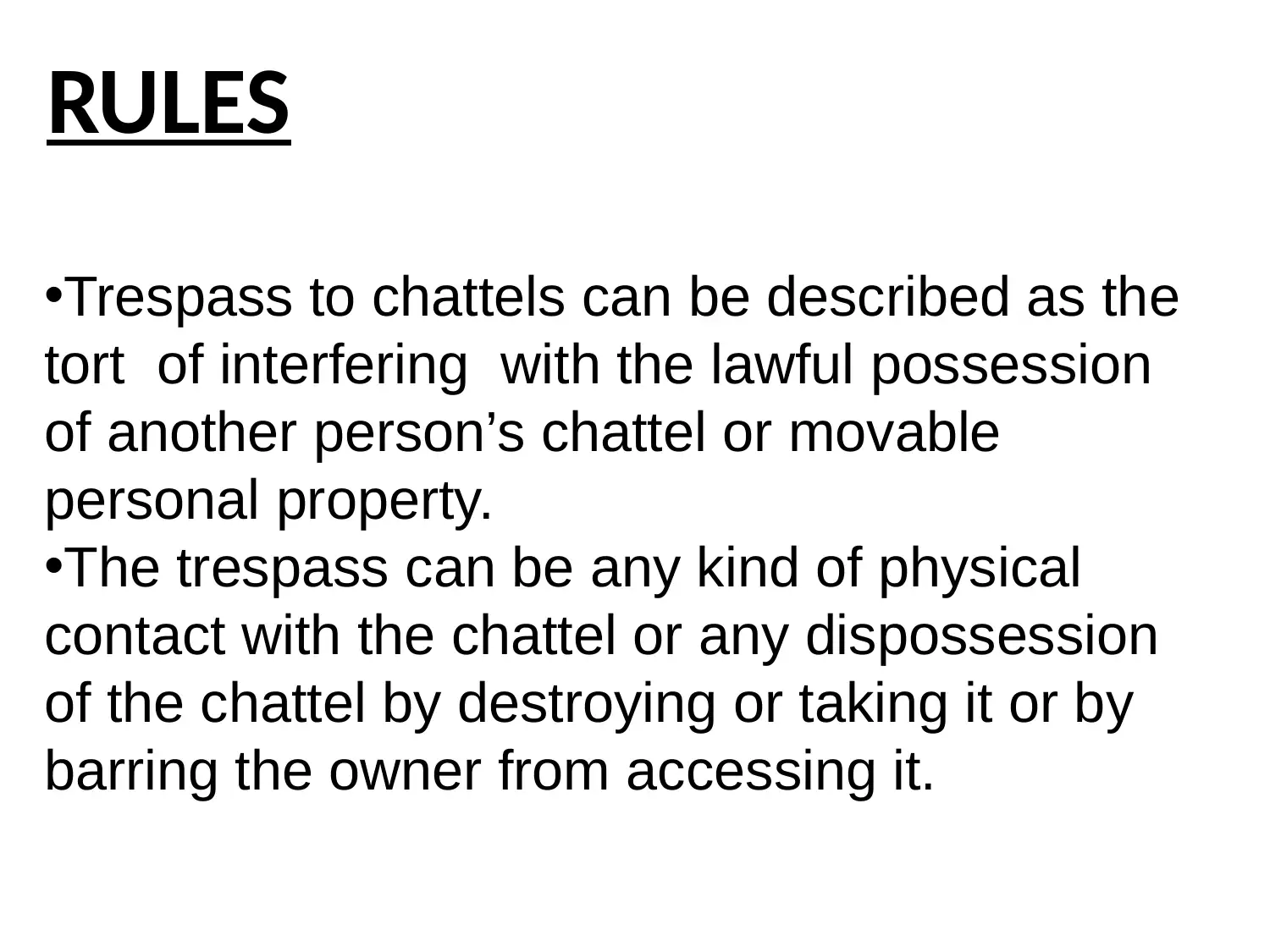
•Trespass to chattels can be described as the
tort of interfering with the lawful possession
of another person’s chattel or movable
personal property.
•The trespass can be any kind of physical
contact with the chattel or any dispossession
of the chattel by destroying or taking it or by
barring the owner from accessing it.
RULES
tort of interfering with the lawful possession
of another person’s chattel or movable
personal property.
•The trespass can be any kind of physical
contact with the chattel or any dispossession
of the chattel by destroying or taking it or by
barring the owner from accessing it.
RULES
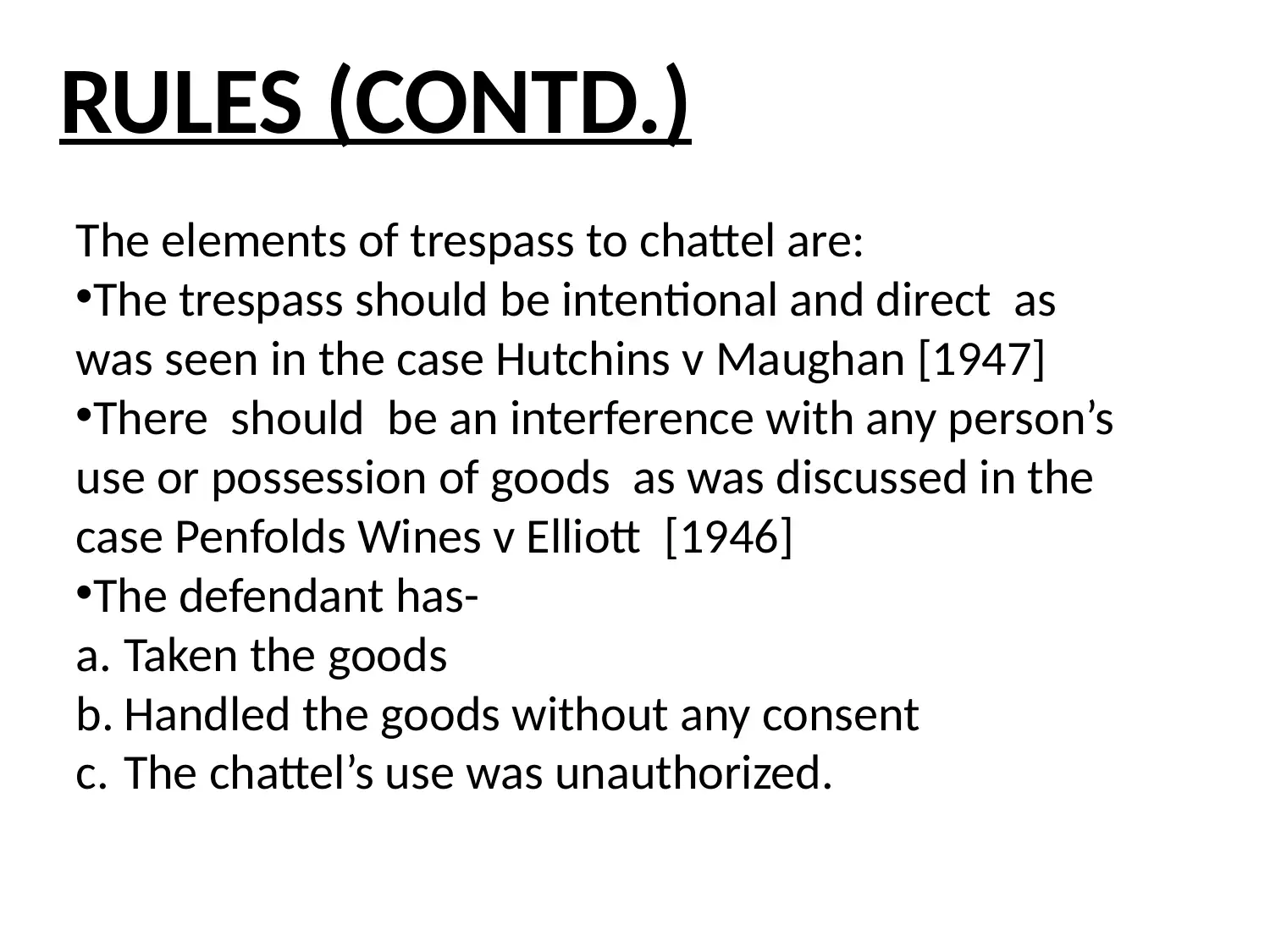
The elements of trespass to chattel are:
•The trespass should be intentional and direct as
was seen in the case Hutchins v Maughan [1947]
•There should be an interference with any person’s
use or possession of goods as was discussed in the
case Penfolds Wines v Elliott [1946]
•The defendant has-
a. Taken the goods
b. Handled the goods without any consent
c. The chattel’s use was unauthorized.
RULES (CONTD.)
•The trespass should be intentional and direct as
was seen in the case Hutchins v Maughan [1947]
•There should be an interference with any person’s
use or possession of goods as was discussed in the
case Penfolds Wines v Elliott [1946]
•The defendant has-
a. Taken the goods
b. Handled the goods without any consent
c. The chattel’s use was unauthorized.
RULES (CONTD.)
Secure Best Marks with AI Grader
Need help grading? Try our AI Grader for instant feedback on your assignments.
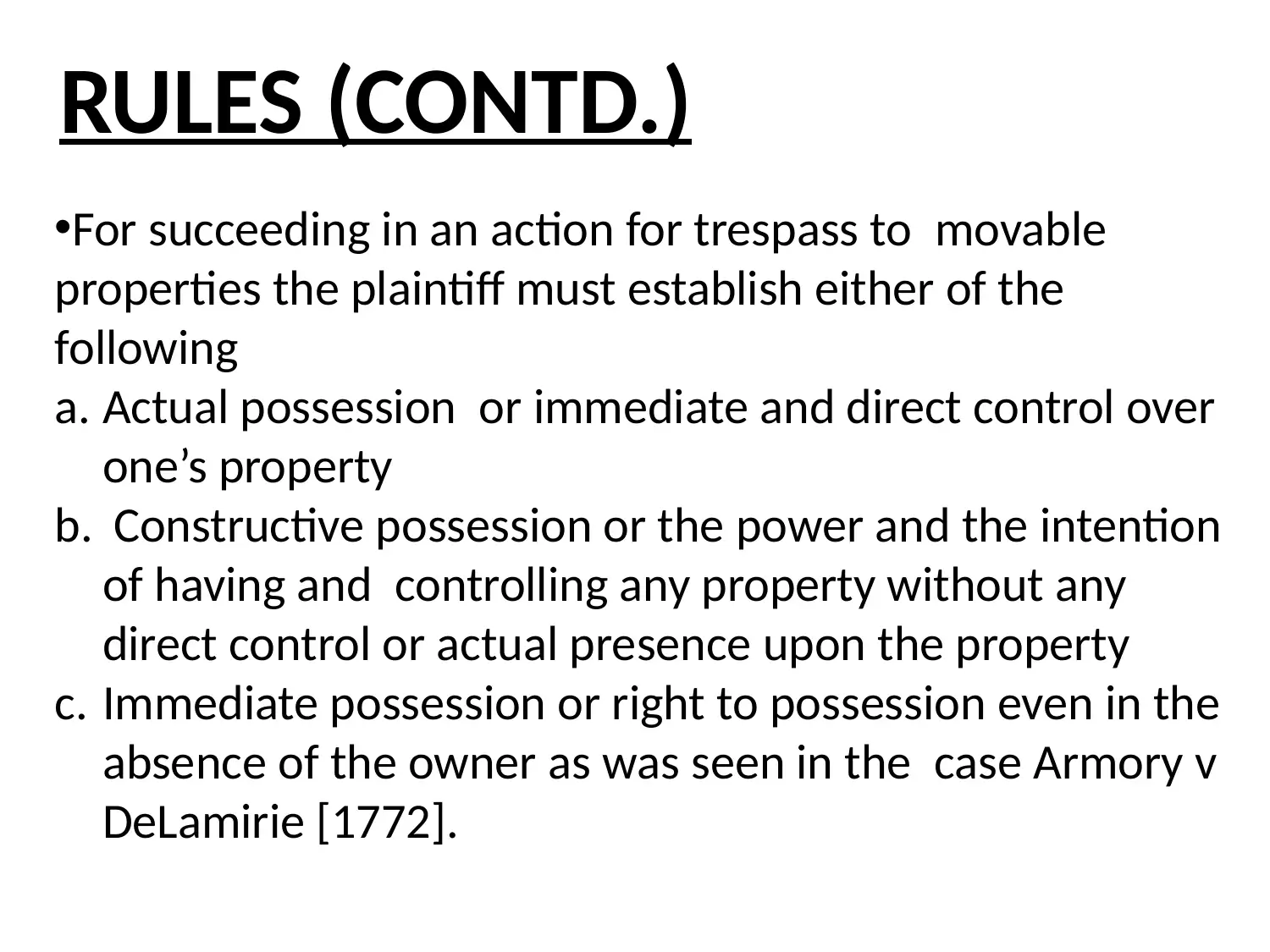
RULES (CONTD.)
•For succeeding in an action for trespass to movable
properties the plaintiff must establish either of the
following
a. Actual possession or immediate and direct control over
one’s property
b. Constructive possession or the power and the intention
of having and controlling any property without any
direct control or actual presence upon the property
c. Immediate possession or right to possession even in the
absence of the owner as was seen in the case Armory v
DeLamirie [1772].
•For succeeding in an action for trespass to movable
properties the plaintiff must establish either of the
following
a. Actual possession or immediate and direct control over
one’s property
b. Constructive possession or the power and the intention
of having and controlling any property without any
direct control or actual presence upon the property
c. Immediate possession or right to possession even in the
absence of the owner as was seen in the case Armory v
DeLamirie [1772].
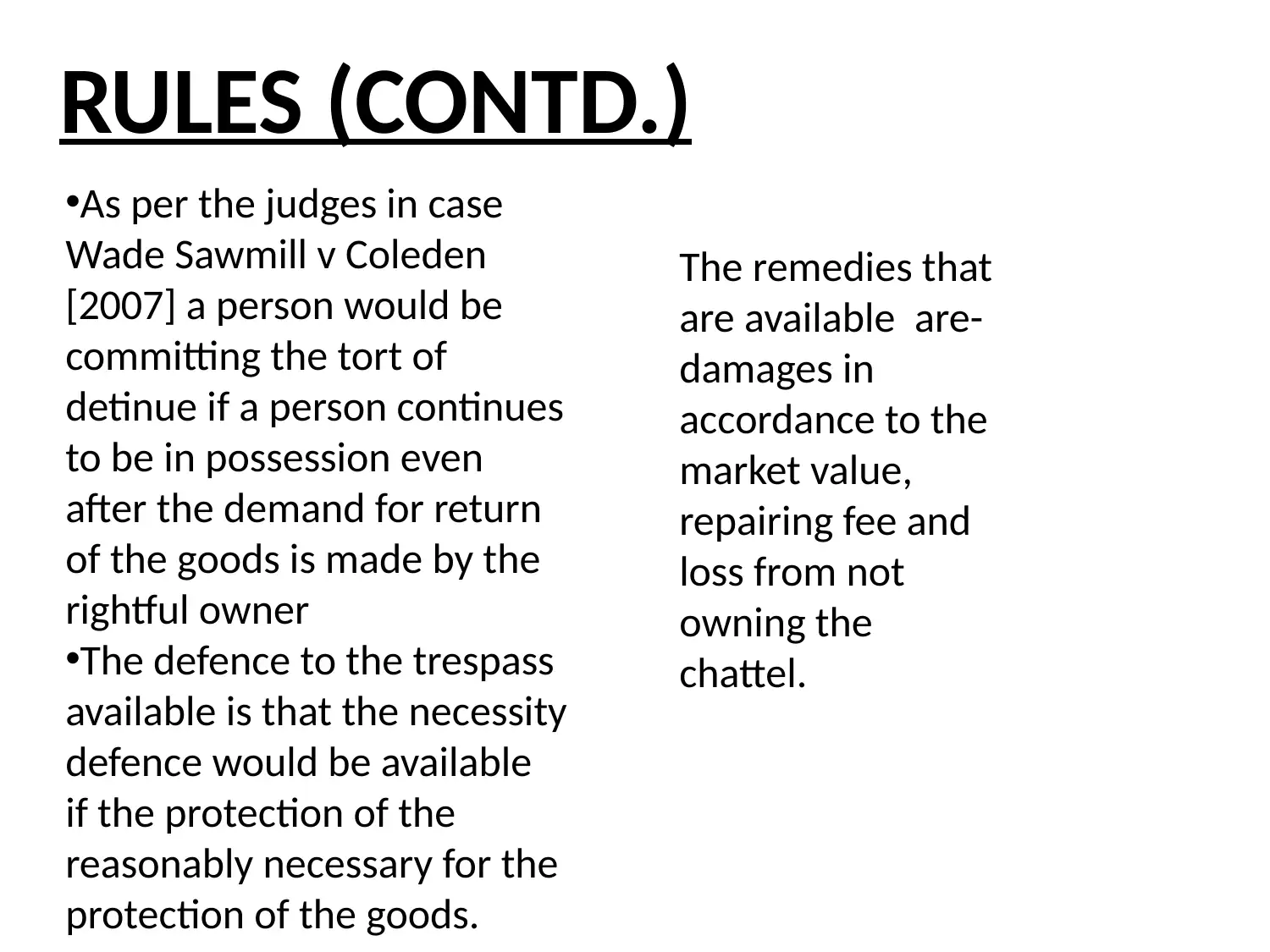
RULES (CONTD.)
•As per the judges in case
Wade Sawmill v Coleden
[2007] a person would be
committing the tort of
detinue if a person continues
to be in possession even
after the demand for return
of the goods is made by the
rightful owner
•The defence to the trespass
available is that the necessity
defence would be available
if the protection of the
reasonably necessary for the
protection of the goods.
The remedies that
are available are-
damages in
accordance to the
market value,
repairing fee and
loss from not
owning the
chattel.
•As per the judges in case
Wade Sawmill v Coleden
[2007] a person would be
committing the tort of
detinue if a person continues
to be in possession even
after the demand for return
of the goods is made by the
rightful owner
•The defence to the trespass
available is that the necessity
defence would be available
if the protection of the
reasonably necessary for the
protection of the goods.
The remedies that
are available are-
damages in
accordance to the
market value,
repairing fee and
loss from not
owning the
chattel.
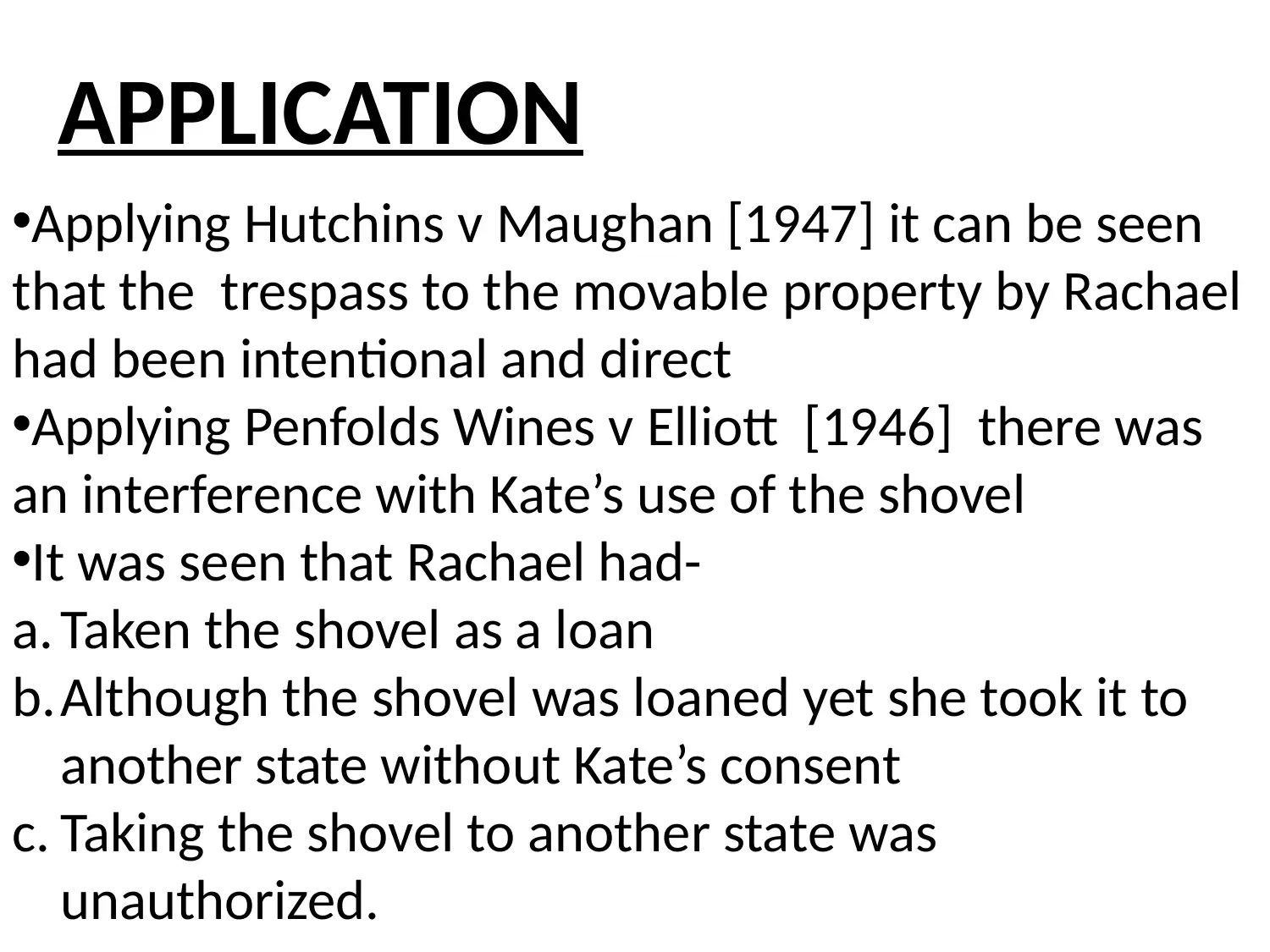
APPLICATION
•Applying Hutchins v Maughan [1947] it can be seen
that the trespass to the movable property by Rachael
had been intentional and direct
•Applying Penfolds Wines v Elliott [1946] there was
an interference with Kate’s use of the shovel
•It was seen that Rachael had-
a. Taken the shovel as a loan
b.Although the shovel was loaned yet she took it to
another state without Kate’s consent
c. Taking the shovel to another state was
unauthorized.
•Applying Hutchins v Maughan [1947] it can be seen
that the trespass to the movable property by Rachael
had been intentional and direct
•Applying Penfolds Wines v Elliott [1946] there was
an interference with Kate’s use of the shovel
•It was seen that Rachael had-
a. Taken the shovel as a loan
b.Although the shovel was loaned yet she took it to
another state without Kate’s consent
c. Taking the shovel to another state was
unauthorized.
Paraphrase This Document
Need a fresh take? Get an instant paraphrase of this document with our AI Paraphraser
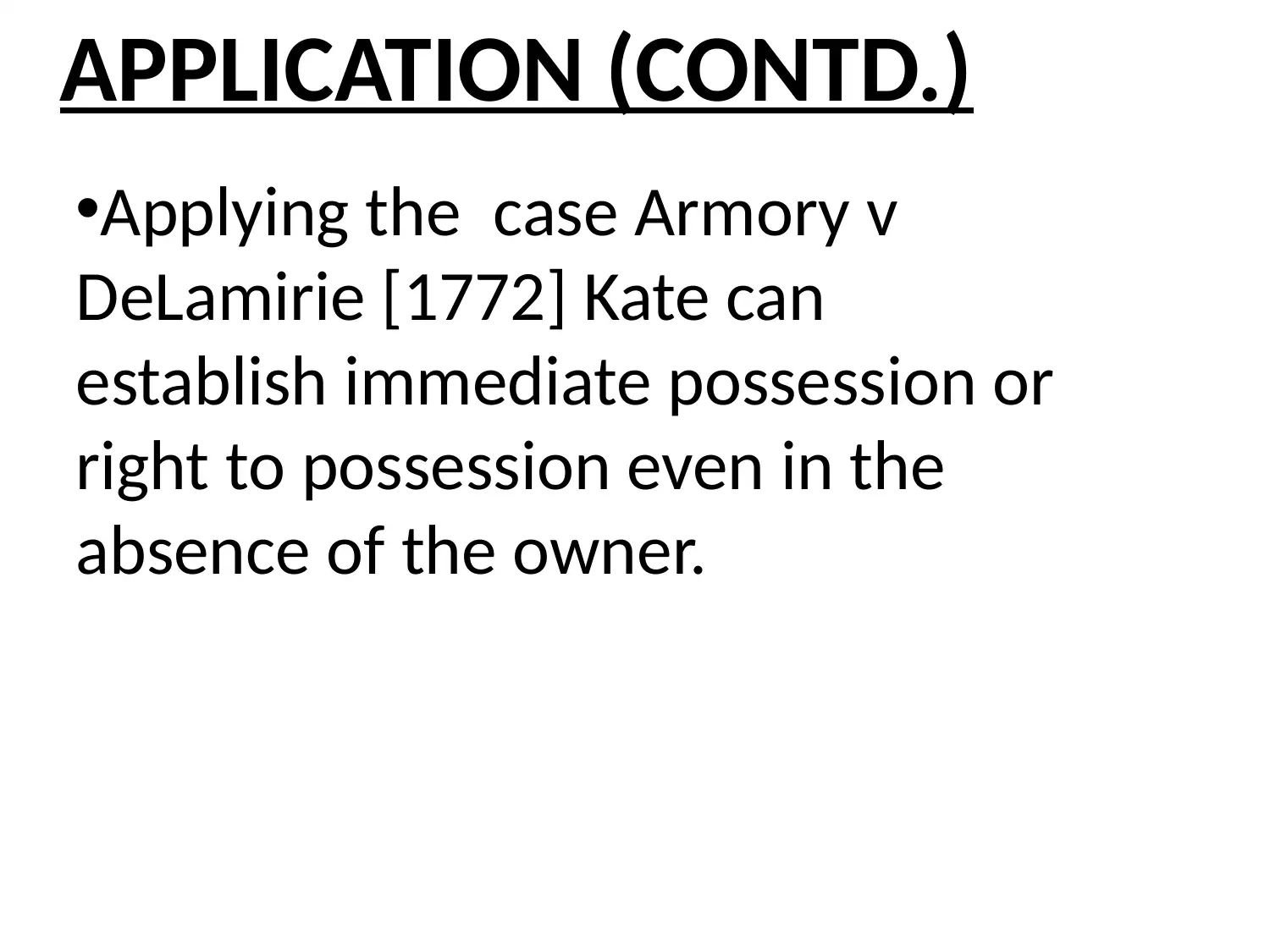
APPLICATION (CONTD.)
•Applying the case Armory v
DeLamirie [1772] Kate can
establish immediate possession or
right to possession even in the
absence of the owner.
•Applying the case Armory v
DeLamirie [1772] Kate can
establish immediate possession or
right to possession even in the
absence of the owner.
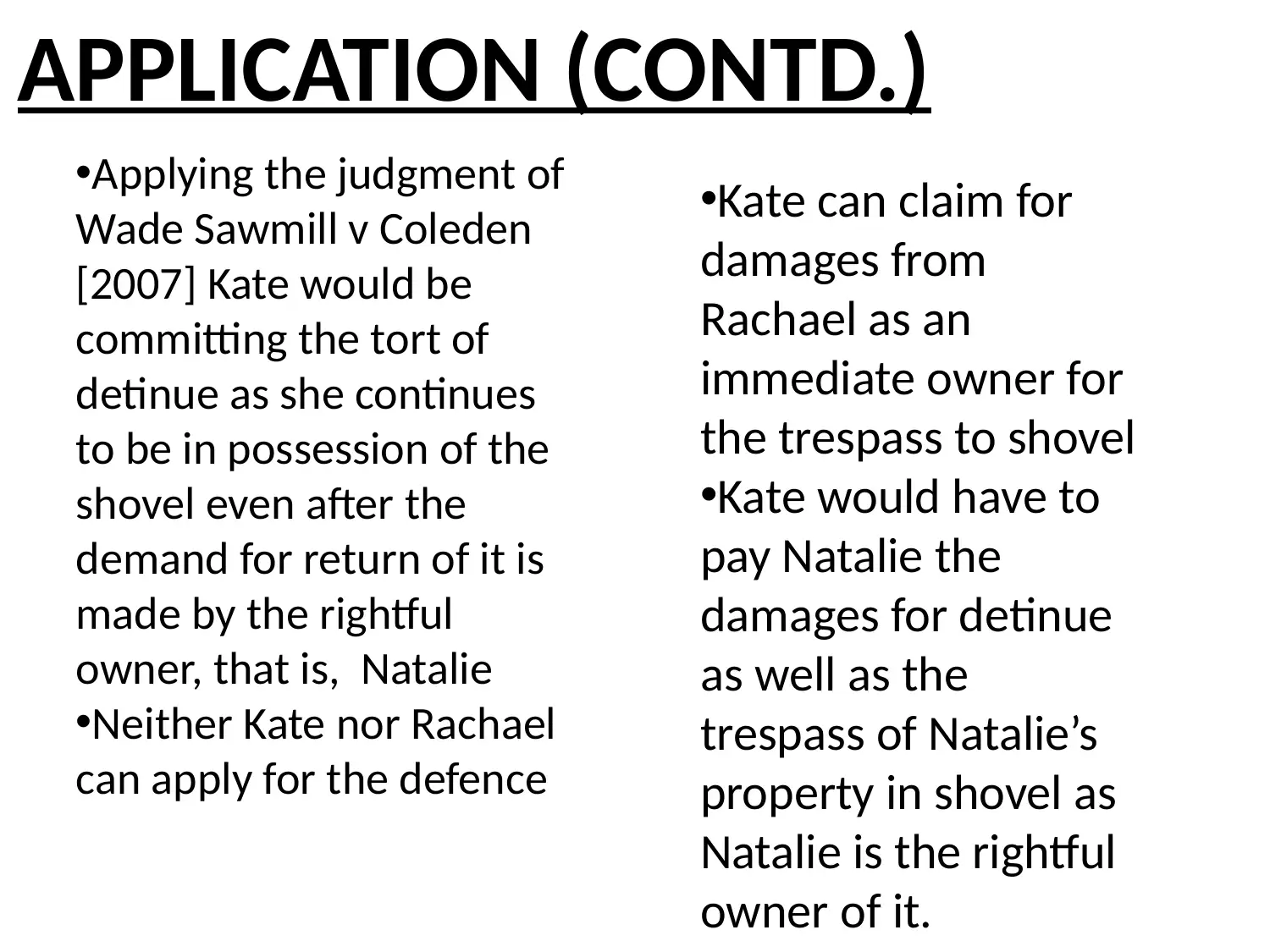
APPLICATION (CONTD.)
•Applying the judgment of
Wade Sawmill v Coleden
[2007] Kate would be
committing the tort of
detinue as she continues
to be in possession of the
shovel even after the
demand for return of it is
made by the rightful
owner, that is, Natalie
•Neither Kate nor Rachael
can apply for the defence
•Kate can claim for
damages from
Rachael as an
immediate owner for
the trespass to shovel
•Kate would have to
pay Natalie the
damages for detinue
as well as the
trespass of Natalie’s
property in shovel as
Natalie is the rightful
owner of it.
•Applying the judgment of
Wade Sawmill v Coleden
[2007] Kate would be
committing the tort of
detinue as she continues
to be in possession of the
shovel even after the
demand for return of it is
made by the rightful
owner, that is, Natalie
•Neither Kate nor Rachael
can apply for the defence
•Kate can claim for
damages from
Rachael as an
immediate owner for
the trespass to shovel
•Kate would have to
pay Natalie the
damages for detinue
as well as the
trespass of Natalie’s
property in shovel as
Natalie is the rightful
owner of it.
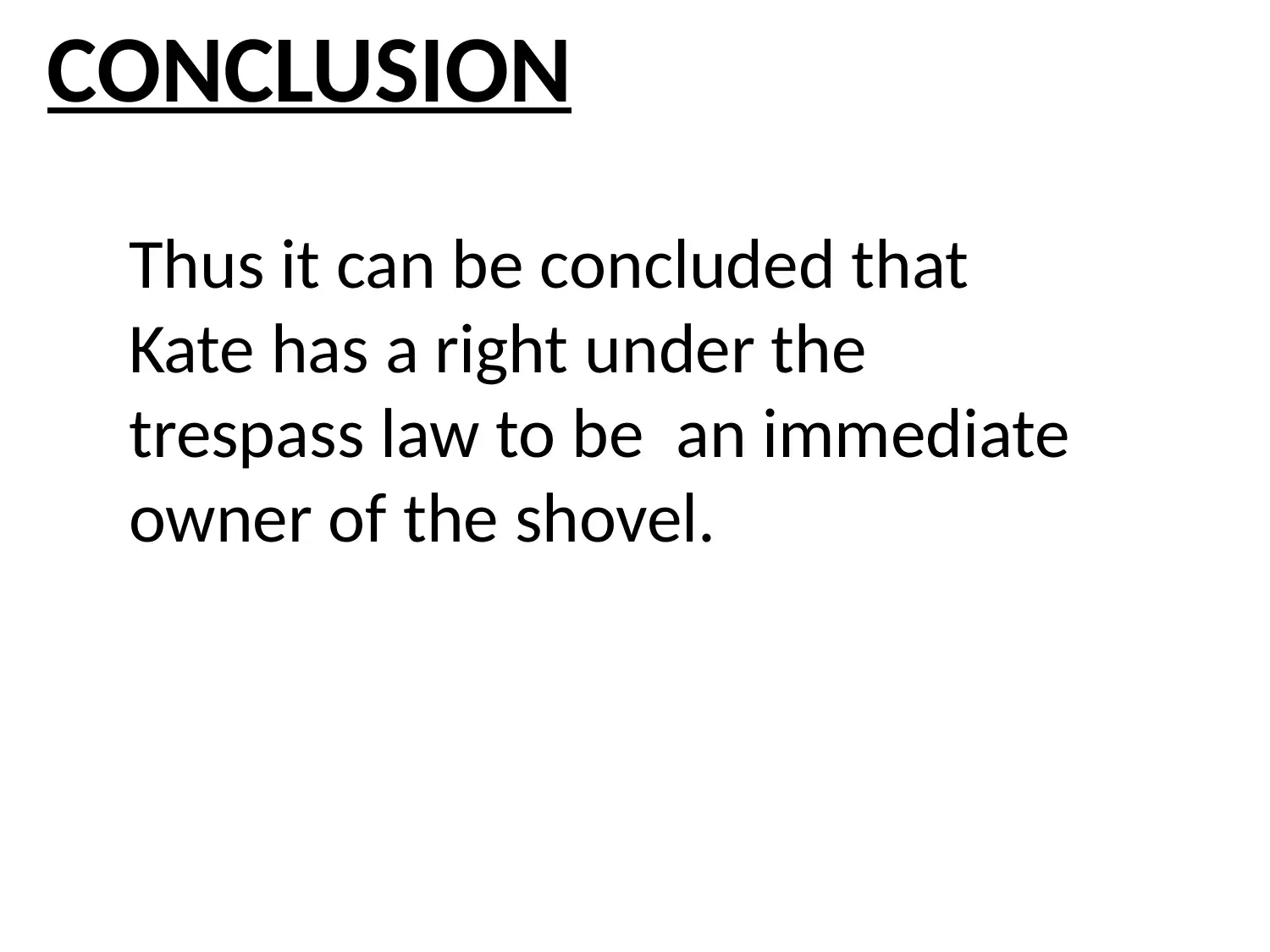
CONCLUSION
Thus it can be concluded that
Kate has a right under the
trespass law to be an immediate
owner of the shovel.
Thus it can be concluded that
Kate has a right under the
trespass law to be an immediate
owner of the shovel.
Secure Best Marks with AI Grader
Need help grading? Try our AI Grader for instant feedback on your assignments.
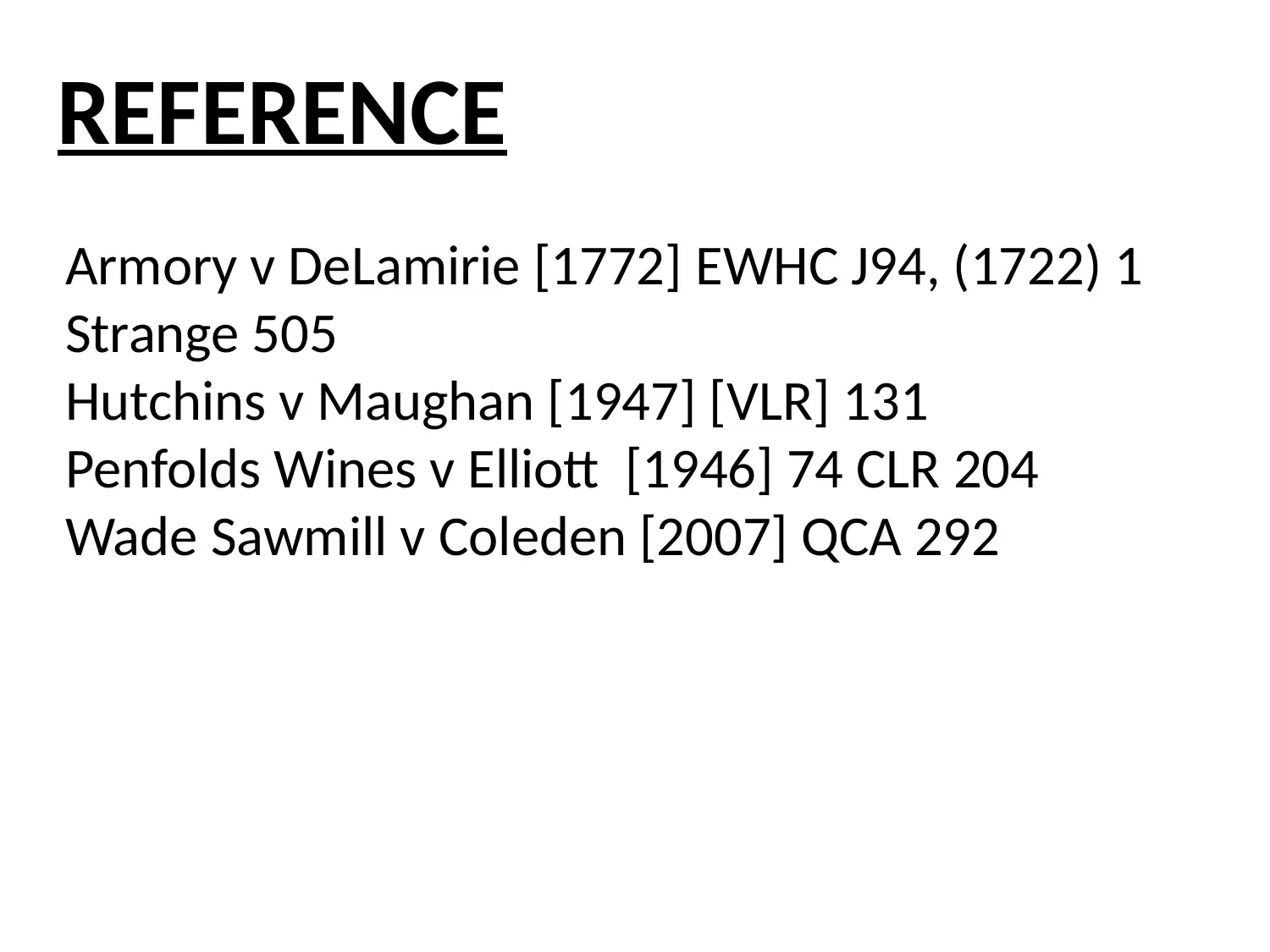
REFERENCE
Armory v DeLamirie [1772] EWHC J94, (1722) 1
Strange 505
Hutchins v Maughan [1947] [VLR] 131
Penfolds Wines v Elliott [1946] 74 CLR 204
Wade Sawmill v Coleden [2007] QCA 292
Armory v DeLamirie [1772] EWHC J94, (1722) 1
Strange 505
Hutchins v Maughan [1947] [VLR] 131
Penfolds Wines v Elliott [1946] 74 CLR 204
Wade Sawmill v Coleden [2007] QCA 292

1 out of 12
Your All-in-One AI-Powered Toolkit for Academic Success.
+13062052269
info@desklib.com
Available 24*7 on WhatsApp / Email
![[object Object]](/_next/static/media/star-bottom.7253800d.svg)
Unlock your academic potential
© 2024 | Zucol Services PVT LTD | All rights reserved.